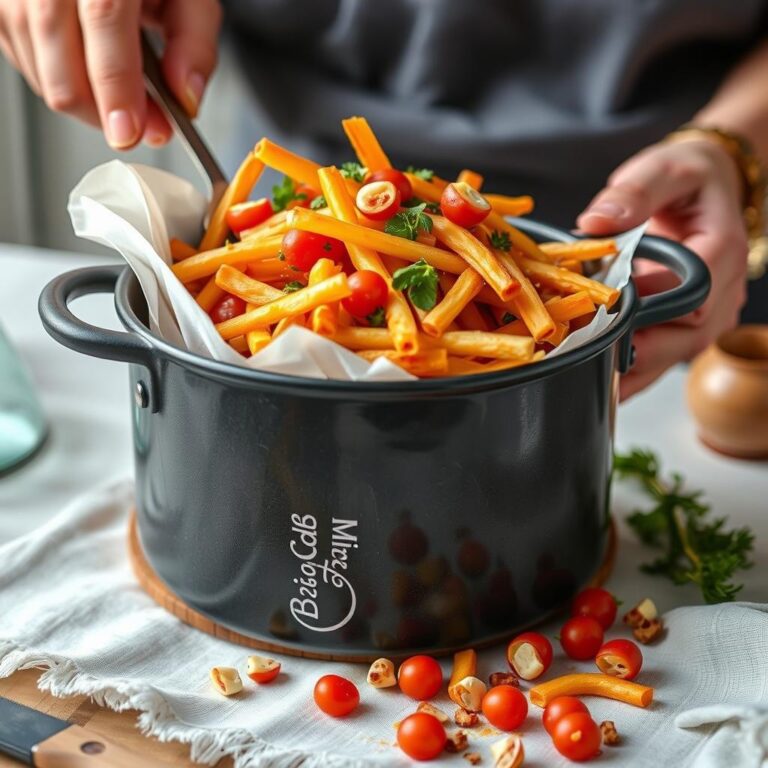Ever opened your kitchen trash and thought, “Where did all this come from?”
You’re not alone. Many of us wonder how to reduce kitchen waste. Honestly, it’s something that’s on everyone’s radar these days, from your next-door neighbor to global eco-warriors.
Why Kitchen Waste Reduction Matters
Let’s cut to the chase: reducing kitchen waste isn’t just about keeping your kitchen neat. It’s bigger. We’re talking less garbage in landfills, lower carbon footprints, and helping our wallets too.
Plus, less waste means less guilt. And who doesn’t want to feel good about contributing to a cleaner planet?
Dive into Your Trash
First thing’s first: get familiar with what you’re tossing. It’s like a treasure hunt, minus the treasure.
- Food scraps
- Plastic wrap
- Cardboard boxes
- Glass jars
These are big hitters. Knowing them is the first step in learning to reduce kitchen waste.
Smart Shopping
Next, let’s tackle shopping. This is where battle plans are made or broken.
- Make a list and stick to it. Impulse buys lead to more waste.
- Choose loose produce. Less packaging means less waste.
- Bulk buys rule…if you’ll use it all. Think giant bags of rice, not 20 heads of lettuce.
Smart shopping is a simple but powerful way to reduce kitchen waste from the get-go.
Reuse and Repurpose
You’ve heard it before: reduce, reuse, and recycle. But how often do we actually do it?
Here’s how:
- Reuse glass jars for storage. Great for grains, spices, or even leftovers.
- Repurpose old containers as planters. Who doesn’t love a good basil plant in the kitchen?
- Upcycle food scraps into delicious stocks and broths. There’s gold in them there peels!
These small steps can lead to big reductions in kitchen waste.
Composting Like a Pro
Composting is like magic for reducing kitchen waste. Seriously, you toss scraps in, and out comes nutrient-rich compost.
Here’s a quick guide:
- Find a spot: Dark corners or under the sink work if you’re short on space.
- Collect scraps: Fruit peels, veggie scraps, even coffee grounds.
- Stir now and then: Keeps things aerated and breaks down faster.
If you haven’t tried it yet, composting can transform how you see waste. Turning kitchen scraps into soil is the ultimate recyclist move.
Conclusion: Your Role in Reducing Kitchen Waste
In wrapping up, reducing kitchen waste is about being informed and making small changes. Every glass jar saved and food scrap composted adds up.
From understanding your waste, shopping smart, reusing, and composting, remember that your kitchen can be a place of sustainability and creativity.
So, how to reduce kitchen waste? Just start with one change. Your future self and the planet will thank you.
How often do you find yourself pondering how to reduce kitchen waste, only to feel overwhelmed by where to start?
No beefing up on footnotes; let’s cut to the chase.
Less waste means more savings in your pocket.
It’s like paying yourself to be eco-friendlier.
Understand Your Waste Patterns
So, you want to reduce kitchen waste. First up: know what’s filling your bin. Ever noticed how much celery or lettuce gets the boot? Most of us do.
Focus on these:
- Food waste: It’s a biggie – veggies, fruits, and leftovers.
- Plastic: Packaging that just won’t quit.
Getting a sense of this is step one in learning how to reduce kitchen waste. It’s about spotting the usual suspects and then tackling them.
Plan Meals Like a Pro
Say goodbye to last-minute dinner confusion and hello to a smarter kitchen life.
Here’s the deal:
- Create a weekly menu: Consider it your game plan.
- Leverage leftovers: Yesterday’s dinner can be today’s burrito filling.
- Freeze and save: Cooked too much? Portion and freeze for later.
Wrap your head around meal planning, and you’ll notice the kitchen waste numbers starting to dip.
Choose Reusable Over Disposal Every Time
When it comes to reducing kitchen waste, think long-term.
- Swap plastic cling wraps: Opt for beeswax wraps that have staying power.
- Invest in glass containers: They last longer and you’ll be glad you did.
- Consider reusable shopping bags: Help the planet while looking chic.
These swaps, though simple, create less demand for disposables and more space in your wallet.
Embrace the Art of Composting
Feeling like a kitchen waste reduction wizard yet?
Compost can be your magic wand.
Here’s a quick lowdown:
- Designate a compost bin spot; size doesn’t matter.
- Collect all those food scraps: think peels and past-their-prime veggies.
- Mix, stir, let it break down, and voila – natural fertilizer for your garden.
Dazzling, isn’t it? Composting is a win-win for you and mother earth.
Reduce, Reuse, Recycle – The Holy Trinity
We’re intimate with this mantra, but let’s dig deep.
Reduce
- Avoid over-buying: Only purchase what you can reasonably consume.
- Cook smarter: Recipes tailored to your pantry mean less uneaten food.
Simplistic, yet profound in how it helps to reduce kitchen waste.
Reuse
Get creative with what you might normally toss.
- Glass jars: Perfect for pantry organization or homemade salsa.
- Leftover cardboard: Use for kids’ crafts or as seed starters.
Your creativity is your best ally in reducing kitchen waste through reusing. Why throw when you can also grow?
Recycle
Lastly, check your area’s recycling guidelines.
Ensure these are on your list:
- Paper and cardboard: Flatten those boxes.
- Bottles and cans: Rinse them out—easy-peasy.
Recycling is your deal-knower in this whole reduce kitchen waste saga—it saves resources and steps up your eco-game.
FAQs on Reducing Kitchen Waste
Let’s hit some common questions many people ask about reducing kitchen waste.
Does composting really make a difference?
Absolutely! Composting takes waste that’d typically end up in a landfill and returns it back to nature.
How can I make meal planning a habit?
Set aside 30 minutes weekly to brainstorm meals and list out your shopping essentials. Consistency is your ally.
Are reusable items costly upfront?
They might cost more initially, but you’ll save in the long run. Less buying, fewer single-use purchases—it all adds up.
Conclusion: Kitchen Waste as a Catalyst for Change
Ultimately, the journey to reduce kitchen waste is stitched with small, actionable changes.
Start by exploring what fills your trash, then move on to strategic shopping, intentional cooking, and composting.
Reducing kitchen waste isn’t just about minimizing trash. It’s about adopting a lifestyle where sustainability isn’t an afterthought, but a daily practice.
Learn, adjust, progress. Your approach to reduce kitchen waste can be your personal stride to a greener mindset.







